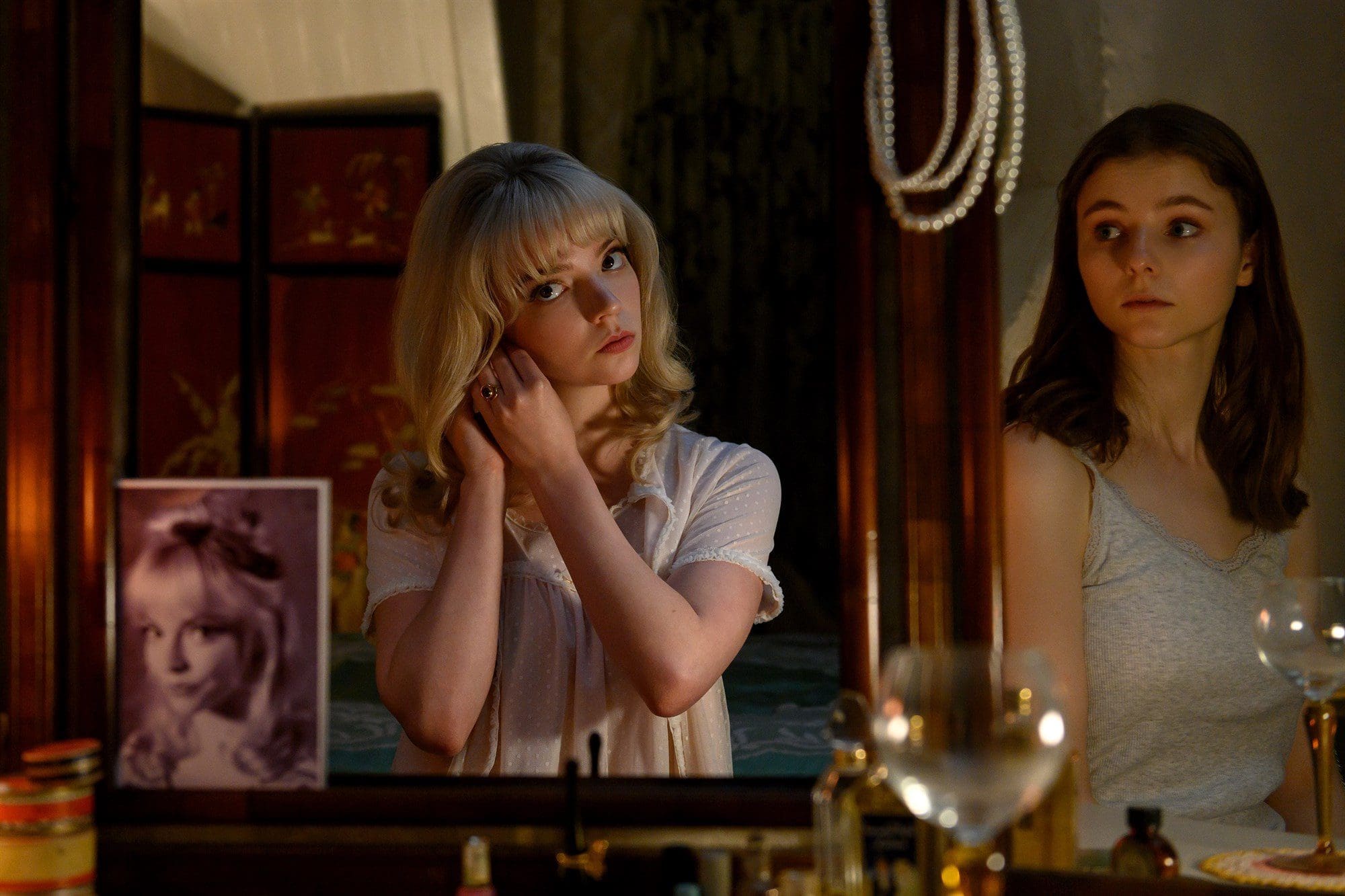
In an interview with Esquire in 2019, Edgar Wright said his inspiration for Last Night In Soho came from, “living and working in Soho and Fitzrovia and literally pounding the pavement late at night walking home, starting to think about what these walls had seen.” To answer that question, his cinematic answer needed a character who could hear them. Enter Last Night In Soho’s Ellie (Thomasin McKenzie), an introverted fashion major who can speak to the dead and see things others can’t. After a nasty night with new college roommate, Jocasta (Synnove Karlsen), she takes residence in an older apartment, wherein her powers are amplified and she’s brought on a journey to the past.
Ellie’s powers are vaguely defined but broadly effective. Before her new residence, we just get some exposition and moments where Ellie shares eye contact with her ghostly Mom (Aimee Cassettari). But everything changes on her first night alone. Her abilities bring her to a place we (and possibly she) couldn’t imagine: to 1967 London as seen by Sandie (Anya Taylor-Joy).
Sandie sees herself as a temporarily inconvenienced superstar. On Ellie’s first visit, Sandie enters a gorgeous ballroom and the framing gives the impression everyone is looking at her. We’re told otherwise with the next shot, which reveals the singer everyone is really fixated on, but this reveal doesn’t subvert what we think of Sandie, it simply postpones it. As if to say, “they’re not looking at her now, but they will be soon.”
The way the filmmaking portrays Ellie’s relationship with Sandie sells this. Their presence in the world is synchronized through tricks, mirrors and the like, but McKenzie’s wide-eyed infatuation distinguishes her character from Sandie. In this world, Ellie is not the same as Sandie, but Sandie brings her along for a ride—one she goes on every night in sleep.
At first, this is all good for Ellie. It positively influences her self-esteem and school work and while it has a negative impact on her social life, that doesn’t bother her (at first). These joys are cut short, though, when Sandy is forced into prostitution. If that sounds like a dark, controversial turn, it is. Sandie’s characterization after this turn has received particular scrutiny, in part because viewers can read the film as demonizing her. Personally, I believe Soho is on Sandie’s side. But the film opens itself up to this scrutiny by focusing on issues like sexual violence and enforced sex work and “doesn’t demonize the sexually abused sex worker” is a low bar to clear when the film is making such big swings.
There’s a moment in the climax that, without dismissing the criticisms entirely, could convey a different message from the sex-negative readings of the film. There’s a shift in Sandie and Ellie’s relationship. It’s a simple shift, born entirely of their different perspectives. Not opposing, but different, in the way that any two people have different perspectives — even if they’ve lived similar lives or completely agree on every subject.
In Ellie’s case, just that inherently different perspective nearly shatters their previously synchronous relationship. It tells us that, while Ellie was indeed brought along for a ride, Sandie was unaware of her passenger. When Sandie becomes aware of Ellie’s perspective, there’s a seed of distrust, with none of the joy, love, and protective impulses Ellie felt.
All Sandie can see is someone she doesn’t trust.
Ellie’s passionate love and Sandy’s distrust make for a powerful dichotomy, a powerful moment of horror, and an even more powerful emotion that underlies it all. Because in this moment of horrified distrust, Ellie’s horror is not, “I misjudged Sandy”, but instead from pleading. Her eyes scream, “Please believe that I agree with and love you.”
My reading is not the only reading, and it’s certainly not the film’s only potential problem. Last Night in Soho will remain controversial and if any of these subjects particularly resonates with you, proceed with caution. But, for all its potential problems, it’s a film with much to admire. It feels like I’ve only scratched the surface of what the film is aspiring for. For better, or for worse.

